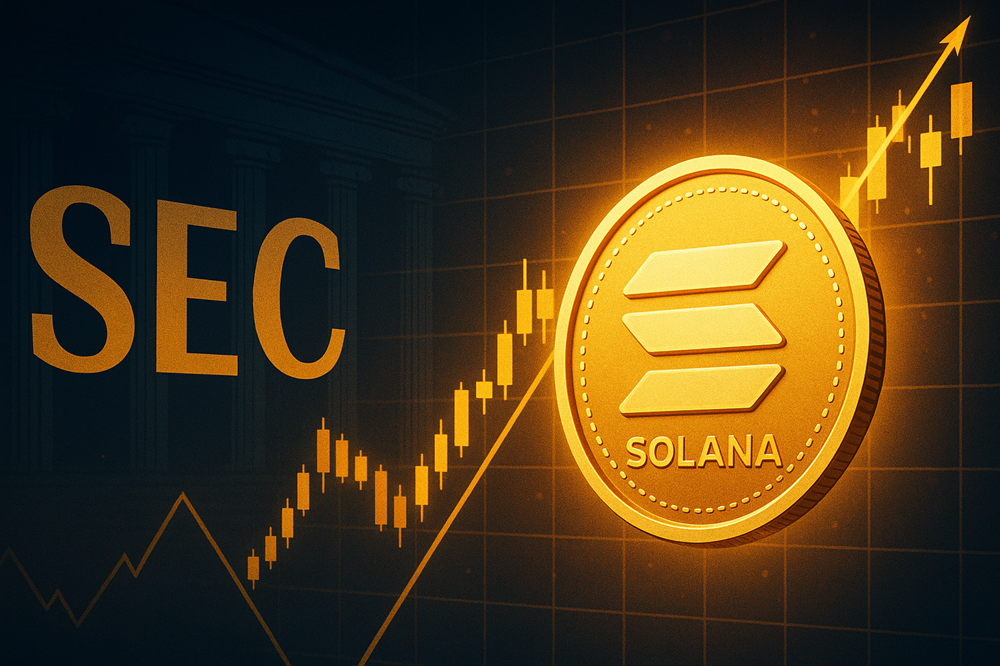In the rapidly evolving landscape of digital assets, the regulatory environment often plays catch-up with technological advancements. For investors and stakeholders, understanding these dynamics is crucial. Recent developments involving the U.S. Securities and Exchange Commission (SEC) signal important shifts in the crypto market, particularly with the increasing focus on Exchange-Traded Funds (ETFs) linked to cryptocurrencies like Solana. This overview provides insights into the SEC’s current actions, market implications, and future projections for Solana and other digital asset ETFs.
SEC Accelerates Timeline for Solana ETF Approval Amid Market Changes
Solana’s Potential Third Spot in Crypto ETFs
The spotlight is currently on Solana, as the SEC pushes for quicker ETF approvals. This urgency stems largely from the recent emergence of the REX-Osprey SOL + Staking ETF (ticker SSK), which, under the Investment Company Act of 1940, began trading seamlessly without explicit SEC objections, gaining substantial traction on debut. The SEC’s historical approach often involves simultaneous approvals of competing funds, as seen with Bitcoin and Ether ETFs, to maintain a balanced competitive field.
In efforts to streamline the approval process, the SEC is refining its guidelines for digital-asset ETFs. A recent 12-page document outlines critical issues such as custody, staking rewards, and safeguards against market manipulation. The aim is to establish a universal template that would replace the bespoke Form 19b-4 waivers, potentially shortening approval timelines to approximately seventy-five days.
Industry analysts and stakeholders are optimistic yet cautious as the SEC navigates this transition. Bloomberg Intelligence’s James Seyffart highlighted ongoing delays and the anticipation of a cohesive digital asset ETP framework. Meanwhile, Nate Geraci of ETF Store underscored that further clarifications from the SEC are expected by early fall.
Regulatory and Market Challenges
The question of whether Solana’s market can withstand manipulation is pivotal, alongside the sufficiency of the CME’s SOL futures for regulatory oversight. This evaluation process mirrors the scrutiny Bitcoin and Ether underwent in their respective ETF approval processes. Six prominent issuers, including VanEck, Fidelity, and Bitwise, have filed proposals for Solana spot ETFs. A green light before the statutory October deadline would not only make Solana the third crypto asset with a U.S. spot ETF but also set a meaningful precedent for other cryptocurrencies such as XRP, Litecoin, and Dogecoin.
Implications for Investors and Market Timing
Should the SEC approve Solana ETFs ahead of schedule, market participants can anticipate a rapid sequence of launches, reflecting past scenarios where timing was crucial for gaining a market edge. The competitive landscape is thus poised for change, contingent on how swiftly the SEC reconciles the challenges of policy uniformity and competitive equity following SSK’s market intrusion.
As of the latest updates, Solana’s market price stands at $148.93, showcasing resilience amid regulatory discussions. This dynamic highlights the importance of staying informed through reliable platforms like Finances Zippy, which offer real-time insights and expert analysis for investors navigating these complexities.
Ensuring Content Reliability and Integrity
At the core of our editorial policy, we emphasize delivering content that is thoroughly researched, accurate, and unbiased. Our stringent sourcing standards involve comprehensive checks by top technology experts and seasoned editors, ensuring the information’s trustworthiness and relevance for our audience.
Is Solana (SOL) a viable ETF investment?
Solana’s technological robustness, characterized by its high throughput and efficient consensus mechanism, positions it as a compelling choice for ETF inclusion. However, potential investors should evaluate the regulatory landscape, market stability, and technological developments before investing.
How does the SEC approval process impact cryptocurrency ETFs?
The SEC approval process for ETFs significantly influences investor confidence and market dynamics. An expedited approval can accelerate market entry, potentially affecting asset liquidity and investor strategies. It also reflects regulatory confidence in the asset’s market integrity and transparency.
What makes Solana different from other cryptocurrencies in the ETF space?
Solana distinguishes itself with its high-speed transactions and low costs, attributed to its unique Proof of History consensus. This technical advantage makes it an attractive option for ETF issuers looking to diversify their offerings, potentially appealing to investors seeking a scalable blockchain solution.
By staying abreast of these regulatory developments and understanding their implications, investors can better navigate the evolving digital asset landscape, making informed decisions aligned with their financial goals.

